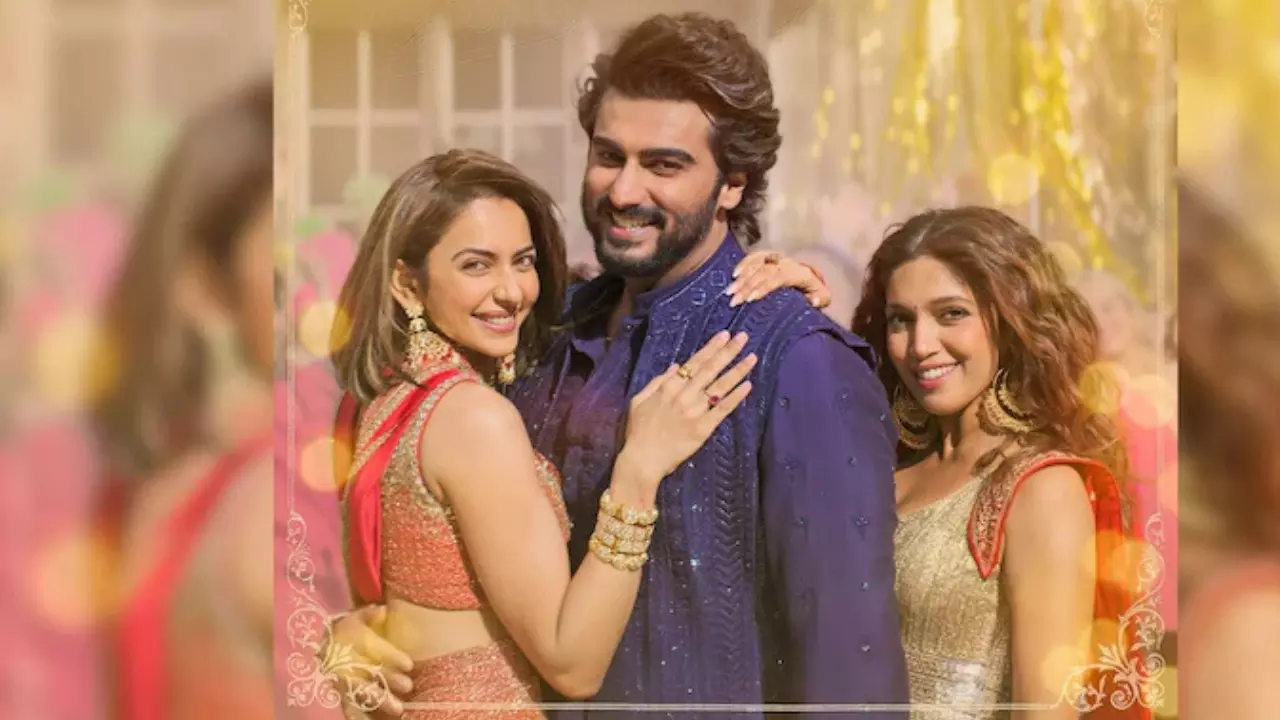Mere Husband Ki Biwi Review: A Stale Rom-Com Struggling to Find Its Spark
Mere Husband Ki Biwi attempts a zany rom-com but stumbles with a predictable plot, lackluster execution, and uninspired humor. Despite a talented cast—Arjun Kapoor, Bhumi Pednekar, and Rakul Preet Singh—the film struggles to balance comedy and drama, ultimately delivering a forgettable experience. Read our review.
Movie review

A marriage annulled comes back to haunt a man just as he is about to embark on a new romantic journey. What should be a smooth transition into love turns into a battleground when the ex-wife, still harboring resentment, goes all out to disrupt his happily-ever-after. As she locks horns with his bride-to-be, the stage is set for a classic rom-com conflict. But does Mere Husband Ki Biwi manage to deliver the hilarity and heart expected from such a premise? Not quite.
Caught between its intentions and execution, Mere Husband Ki Biwi flounders in its attempt to craft a compelling romantic comedy. The film struggles to bring anything fresh to the table, relying instead on overused tropes and a tired narrative structure.
A Predictable Love Triangle That Lacks Depth
The film’s premise—a divorced man torn between his fiery ex-wife and his new love—is a well-worn formula in Bollywood. However, instead of injecting novelty or nuance, the screenplay meanders through predictable emotional chaos, exaggerated confrontations, and half-hearted romantic dilemmas. What should have been an entertaining cocktail of humour, drama, and romance instead feels like an uninspired rehash of familiar conflicts.
Despite its frothy and lightweight tone, the film fails to sustain interest. It repeatedly circles the central question—who will he choose?—without offering any fresh perspective or compelling resolution.
Recycling Old Tropes Without Innovation
Writer-director Mudassar Aziz, known for films like Happy Bhaag Jayegi, Pati Patni Aur Woh, and Khel Khel Mein, attempts to blend comedy and drama but never quite achieves a seamless union of the two. The film is riddled with moments that feel passably amusing but ultimately lack substance. The humour, at times, lands, but more often than not, it falls flat, weighed down by an unimaginative screenplay.
The characters themselves are drawn from an overused playbook—the strong-willed ex-wife, the glamorous new partner, and the clueless man caught in the middle. Their interactions, rather than feeling organic, are contrived, failing to evoke genuine investment from the audience.
Arjun Kapoor Struggles with a Weakly Written Character
Coming off his villainous turn in Singham Again, Arjun Kapoor returns to his comfort zone as the everyman stuck between two fiery women. The role should have been a breeze for him, but the script offers him little to work with. His character, Ankur, is meant to be the focal point of a modern gender clash but instead comes across as passive, indecisive, and often unremarkable.
Bhumi Pednekar, playing Prabhsimran, the ex-wife, adds some fire to the film, portraying a strong Punjabi woman who refuses to back down. Rakul Preet Singh’s Ankita, the new love interest, is all charm and confidence, but her character, too, is limited by the shallow writing. The two actresses do their best to rise above the predictable storytelling, but the material does not support their efforts.
A Half-Baked Attempt at Gender Commentary
The film attempts to tackle gender dynamics but does so in a superficial and inconsistent manner. At one moment, it aims to challenge traditional marital expectations; the next, it reinforces outdated stereotypes. Ankur’s dissatisfaction with his ex-wife’s professional ambition is framed as a central issue, yet the film hesitates to fully address it, often taking a regressive stance under the guise of comedy.
A wisecracking best friend (Harsh Gujral) provides occasional comic relief, but even his jokes fail to salvage the film’s uninspired execution. The rivalry between the two women—who are both portrayed as intelligent and independent—feels forced and unnecessary. One can’t help but wonder why they are fighting over a man who barely proves himself worthy of such attention.
A Film That Mistakes Loudness for Wit
Mere Husband Ki Biwi mistakenly assumes that stringing together a handful of witty one-liners is enough to carry a comedy. The result is a film that often congratulates itself on its humour when, in reality, its jokes are few and far between. It resembles that one person at a party who believes every sentence they utter is profound and hilarious—only to realize that no one else is laughing.
The film also suffers from pacing issues, taking too long to establish its premise and then rushing toward an incoherent climax. By the time the final act unfolds, the audience is left disconnected, wondering where the narrative was supposed to lead in the first place.
Final Verdict: A Forgettable Rom-Com
Mere Husband Ki Biwi is neither an ambitious failure nor an outright disaster—it’s simply an uninspired, middling affair. While it provides a brief escape from Bollywood’s current trend of historical dramas and socio-political narratives, it does so without offering anything genuinely entertaining or insightful.
The film sets the bar conveniently low, yet it struggles to meet even its own modest expectations. Lacking originality, sharp humour, or emotional depth, it leaves little impact and offers little reason to invest in its story.
Skip this one unless you have a high tolerance for predictable rom-coms with nothing new to say.
Rating: ⭐⭐ (2/5)

